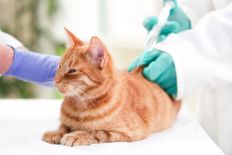
Humans aren’t the only mammals who suffer from diabetes in staggering numbers. Nearly one in every 230 cats and one in 308 dogs suffer from the disease, and these figures appear to be on the rise. Since November is National Pet Diabetes Month, the caring veterinarians at Wahiawa Pet Hospital on Oahu, HI, want to take time to educate the community about the prevalent condition. Although officials originally established the month to promote awareness of diabetes in people, it has become important to draw attention to the issue among domestic animals.
What Are the Types of Diabetes?
Pets may be afflicted by either Type I or Type II diabetes mellitus. Type I occurs when the animal’s body fails to produce enough insulin. As a result, the animal will need insulin therapy for their lifetime. Twice a day, the pet will need to receive insulin from a syringe, which will help promote healthy levels. This form of diabetes tends to be more common among dogs.
 Type II diabetes occurs when the pet produces insulin, but it’s insufficient or, for some reason, cannot be effectively used by the body. This condition tends to be more common in cats, and may only last for several months as opposed to a lifetime.
Type II diabetes occurs when the pet produces insulin, but it’s insufficient or, for some reason, cannot be effectively used by the body. This condition tends to be more common in cats, and may only last for several months as opposed to a lifetime.
What Are the Signs of Diabetes?
If you have a pet, it’s important to look for key signs of diabetes. Excessive thirst and urination are often symptomatic of diabetes. Your pet may also experience significant weight loss or a surge in appetite. Since cataracts are associated with the condition, you may notice a cloudiness in your pet’s eyes. Blindness, weakness, and lethargy are also associated with the disease. Skin conditions, like excessive dandruff or oil, are often-overlooked symptoms. If you notice any of these issues, contact a veterinarian immediately for a proper diagnosis and treatment.
This November, take time to educate yourself and others on the impact of pet diabetes. Schedule an appointment at Wahiawa Pet Hospital by calling (808) 621-7000 today. To help diabetic pets live well, a prompt medical diagnosis and treatment plan from a qualified veterinarian is vital. To learn more about their services, visit the veterinary hospital online.
About the Business
Have a question? Ask the experts!
Send your question

